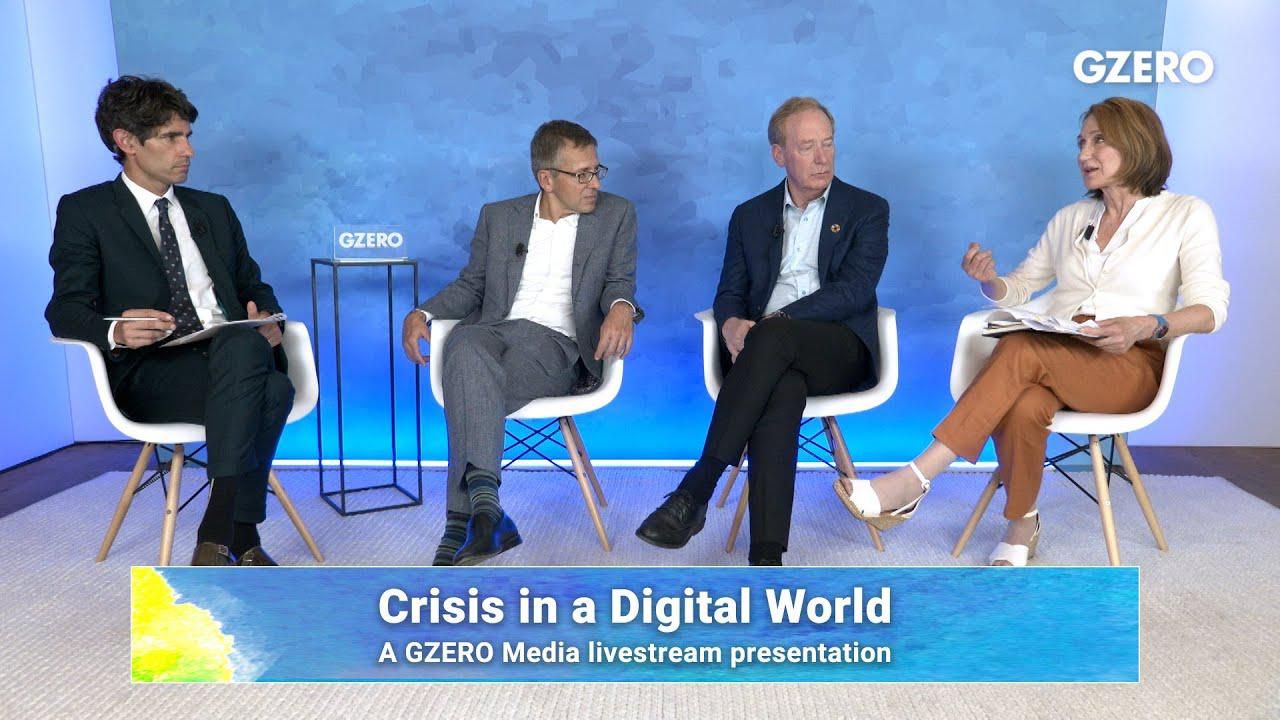After a two-year pandemic hiatus, the World Economic Forum returned Monday to the ski village of Davos in Switzerland, where some 2,000 of the world's most influential leaders gathered this time to talk ... geopolitics.
That's right, for the first time Davos is driven not by business but rather what's happening all over the world — at a time when the general feeling is that globalization is unwinding, GZERO Media President Ian Bremmer said during a Global Stage livestream conversation hosted by GZERO in partnership with Microsoft.
Indeed, former Danish PM Helle Thorning-Schmidt observes "Davos cannot escape geopolitics anymore" because "things are coming apart" with Russia's war in Ukraine and the global food crisis it has made worse.
A focus on global politics may be unavoidable, but "it doesn't mean that people are necessarily excited to come to the party," said Microsoft President Brad Smith, who cited food and energy as two of the second- and third-order consequences of the Russian invasion.
The thing is, Bremmer believes, most people are still unaware of what those consequences will be. In his view, we should brace for the impact of two major knock-on effects: NATO and Russia on the brink of something resembling a hot war, and a lot of starvation if the conflict drags on.
The war is also being fought in the virtual world, where many have been surprised by the lack of successful major Russian cyberattacks against Ukraine. According to Smith, that's in part because Microsoft helped the Ukrainians defend and prepare by taking measures like moving the physical servers of government agencies to the cloud.
And then there's online misinformation, which remains a big problem almost everywhere.
Smith said he believes it's hard for governments to unilaterally decide what constitutes fake news, while Bremmer called for an intergovernmental panel to tackle the issue, and Thorning-Schmidt suggested America can learn from Europe's experience with coalition governments so someday Democrats and Republicans can actually agree on what the problem is first, before trying to fix it.
Meanwhile, Russia's war in Ukraine continues with no end in sight. What's more, Bremmer increasingly sees it as what he calls a "Goldilocks crisis" — not too small to notice, but not so massive "that you legitimately don't have tools to fix."
We do need something to actually make us "jump out of our skins" to address these crises, as UN Foundation President Elizabeth Cousens put it.
The longer the Russians keep fighting the Ukrainians, the worse the knock-on effects of the conflict will get in other parts of the world, like global hunger. For Cousens, ending the catastrophic humanitarian crisis we are already in largely depends on whether governments react by cooperating or doing nationalist stuff that ultimately hurts everyone like export controls.
- "Crisis-rich" WEF 2022: on ending war in Ukraine & redistributing ... ›
- Davos exhibit reveals civilian death toll in Ukraine - GZERO Media ›
- Ukraine war dominates Davos discussions - GZERO Media ›
- Ukraine war dominates Davos discussions - GZERO Media ›
- A different Davos amid geopolitical conflicts and security issues - GZERO Media ›
- Ian Bremmer: Russia's war in Ukraine makes Davos "discomfiting" - GZERO Media ›
- US politics are prone to misinformation, says former Danish PM - GZERO Media ›
- Moisés Naim: With inflation & low trust in democracy, Latin America faces perfect storm for nasty politics - GZERO Media ›
- Highlights from Davos 2022 - GZERO Media ›
- The yet-unseen consequences of Russia's war in Ukraine - GZERO Media ›
- What happened at Davos - GZERO Media ›
- Next steps for a world at a make-or-break moment: Davos 2022 - GZERO Media ›
- How to get students back on track after the Great Education Disruption - GZERO Media ›
- Finland “investing in security and stability” with NATO push - GZERO Media ›
- 2022 has been rough. Will 2023 be any better? - GZERO Media ›
- Europe grapples with insecurity, instability, and proxy war: Davos 2023 - GZERO Media ›
- Podcast: Salvaging the world we leave our kids with innovative philanthropy - GZERO Media ›
- Podcast: When allies unified by Ukraine confront upended security & war fatigue - GZERO Media ›
More For You
How is the US is reshaping global power dynamics, using tariffs and unilateral action to challenge the international order it once led? Michael Froman joins Ian Bremmer on GZERO World to discuss.
Most Popular
In this Quick Take from Munich, Ian Bremmer examines the state of the transatlantic alliance as the 62nd Munich Security Conference concludes.
At the 2026 Munich Security Conference, Brad Smith announces the launch of the Trusted Tech Alliance, a coalition of global technology leaders, including Microsoft, committing to secure cross-border tech flows, ethical governance, and stronger data protections.
